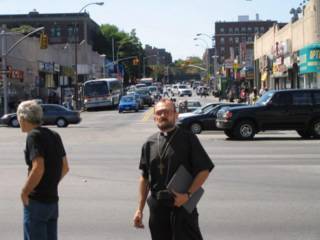LAST CHANCE: Please HELP ALL achieve New York's EDUCATION TAX CREDIT!

We can NOT allow special-interest politics to impede the passage of the Golden-Lopez Education Tax Credit Bill 1939-A or the Governor's Education Tax Credit proposal. The center of a young child's universe is their school. That educational formation must not be disrupted.
Hopefully, this factual synopsis will provide you with a primer, help you decide your position and impel you to take immediate action by advocating and lobbying with us on this legislative VOTE. Your interest in these proposals must survive legislative action toward an agreement on the state budget that is looming next week.
If our Catholic schools are to remain viable then they require the support of the entire Catholic community. This support can be financial, but it can also come from your advocacy for public policies -- such as education tax credits -- that would assist parents and benefactors to have choices in education. This information is offered to give readers another opportunity to find answers and solutions before they make a final decision and pass it along to their law makers...
The Coalition of Independent and Religious Schools sponsored a noontime rally on the east steps of the New York state Capitol in Albany on Feb. 14th. Thousands of people rallied with their Governor and educators. 300,000 postcards supporting the credits also were on display.
There's a broad fallacy predominating that Education Tax Credits benefit only the Roman Catholic parochial school students. Too many people are confusing these with school "vouchers". Hostile opponents liken it to a "back-door" voucher plan for children in failing school districts. That ignorance is promoting a general apathy and anti-Catholic hostility. In fact, both of these are a separate thing altogether.
Voucher money comes directly from government funds, while education tax credits in past rulings have not been considered government funds because they are never in the government's control. Also, vouchers are used to enable parents of public school children to choose another school. Historically, vouchers have been given only to low-income families, families of children in low-performing public schools, or families of special-needs children. (Which have worked out very well in Cleveland, Milwaukee and other large locales, BTW.) Tax credits, on the other hand, can help ALL PARENTS offset expenses for their children's education, regardless of where they attend school.
Besides the State Catholic Conference, the RC Bishops' public policy arm, the bill sponsors are Agudath Israel of America, the Association of Christian Schools International, the Jewish Board of Education of Greater New York, the Lutheran Schools Association and the New York State Association of Independent Schools.
In New York State, more than 80% of parents, including Catholics, enroll their children in public schools, and so the greatest number of tax credits will go to families of public school children. Too many families whose children attend public schools simply cannot afford to obtain the supplemental educational programs and services that they know their children need.
Whether they enroll their children in public schools, charter schools, independent or religious schools, or home school them as many ORC's do, parents strive to do all they can to provide their children with the greatest educational advantage possible, often at tremendous financial sacrifice. Parents have the unique and inimitable right and responsibility to rear their children. They do so not only by providing a loving home and instilling faith and values, but also by directing their children's education.
Current generations are faced with the forces of secularism, moral relativism, individualism, consumerism and hedonism swirling all around us. Faith based education serves to combat those insidious influences by integrating religious truths, moral values and prayer into a holistic (mind, body and soul) approach to living and learning.
Martin Luther, the 16th-century reformer, declared: "True it is that human wisdom and the liberal arts are noble gifts of God, good and useful for all kinds of things, wherefore one cannot do without them in this life. But they can never thoroughly tell us what sin and righteousness are in the Eyes of God, how we can get rid of sin, become pious and just before God, and pass from death into life." He also wrote: "Human reason teaches only the hand and the foot of a man; God alone teaches the heart."
Many families who enroll their children in a religious school find it extremely difficult to keep pace with rising tuition. And for many low-income families, a religious school education is often unobtainable. In those cases, it is not only children, but also society as a whole that suffers. (i.e., Within the NY RCC Archdiocese, 95 percent of high school students graduate in four years and 98 percent of graduates go on to college. The percentage of their students who are actually Catholic, 77 %, is typical both for New York and for the nation. ) We believe that Education Tax Credits can help ALL parents meet the educational needs of their children, regardless of where they are educated. Under these endorsed proposals, greatest benefit is directed toward families with the lowest income.
Tax Credits (two categories):
1.) There are tax credits for personal expenses, such as when a family has to pay for instructional materials, tutoring, school tuition, educational software or special education services. The family would get a tax credit to help offset those expenses.
A tax credit reduces an individual's (or business's) total tax burden on a dollar for dollar basis. For example, if you owe the state $1,500 in income tax, but qualify for a $500 tax credit, you would pay only $1,000 in taxes.
Tax credits can be refundable or non-refundable. Non-refundable credits are only good against your actual tax bill. If, in the previous example, you owed the state only $400, you could claim only a $400 tax credit. You could not claim a refund for the additional $100 difference between the size of the credit and the size of your total state tax burden. Refundable credits, as their name implies, do allow such refunds. Even individuals who paid no taxes could receive a $500 payment if the aforementioned tax credit was designed to be refundable.
2.) There are also donation tax credits that give corporations and individuals a tax incentive to make donations to a school or to an organization that supports education through scholarships, after-school programs etc. Donation tax credits will benefit children in any school that receives increased donations from corporations and individuals. Likewise, greater private school scholarships will be made available through donation tax credits.
A credit is a reduction of the amount of taxes owed. A tax deduction is a reduction of the income on which taxes are paid.
For example, let's say an individual earns $50,000. If his tax rate is seven percent, he owes $3,500 in state income tax. A $3,000 tax credit means he would pay only $500 in income tax, a savings of $3,000. However, a $3,000 tax deduction means he pays seven percent on $47,000 of income, or $3,290 -- a savings of only $210.
Background of Proposals:
This year, Gov. George Pataki's proposed budget, unveiled last January 17th, calls for a long overdue and refundable income tax credit of up to $500 per student in grades K-12 for expenses incurred by parents who live in low-performing school districts. His plan would give a credit of $500 per student to families who live in a public school district that has at least one school designated as underperforming. This would also include every school district here in New York City.
ALL Parents of children in public, nonsectarian, independent and religious schools would be eligible for the credit, which could be used for education-related expenses including:
Tutoring, SAT prep, after-school programs, private school tuition, textbooks, computers, educational software, language classes, summer school, summer programs, summer camps, special needs services, extracurricular activities costs and other education-related expenses, etc. (Transportation costs would be disallowed.)
In the Senate bill, which is sponsored by Martin Golden, our GOP Senator from Bay Ridge, Brooklyn (R-C, 22nd Dist.), the maximum level of credit, $1,500 a student for a maximum of two students, would be given to families with adjusted gross income less than $40,000 a year. For families with income between $40,000 and $100,000, the credits would be determined under a sliding scale starting at $1,000 per student and going down to $500 a student. Families with higher earnings would not be eligible. The plan would be phased in beginning with the earliest grades and would cost the state, or save families, $460 million annually, according to the text of the bill.
The Senate bill also gives teachers a maximum annual tax credit of $250 to buy school supplies. Families earning below $75,000 annually would get the full credit; it would be graduated for those with annual incomes up to $90,000.
Eligible expenses include tutoring, summer instruction and other supplementary instruction, as well as tuition at religious and independent schools.
In addition, NY State Senator Martin Golden, Senator Serphin Maltese and Assemblyman Vito Lopez have introduced a far more generous education tax credit bill for personal expenses. Their legislation provides tax credits that range up to $3,500 per child for families earning the least in any school district and up to $1,100 per child for working middle-class families.
Also, NY Senator Serphin Maltese and Assemblyman Dov Hikind are sponsoring legislation to encourage corporate and individual donations to schools and scholarship-granting institutions and organizations. Meanwhile, Senate and Assembly committees have been meeting to reconcile differences between the two houses' state budget bills before their April 1st deadline.
*** State Democrats, who consider the Governor's proposal "a stealth voucher program", have come up with their own counterproposal: a tax credit for every child in families earning up to $150,000 a year. They said their plan would cost more than the tax credits included in the governor's proposal but could be paid for by rejecting some of the other tax cuts that he wants. Under the Democrats' plan, parents earning up to $150,000 with children under 17 would be eligible to receive a tax credit of up to $400 per child, on a sliding scale based on income. The Governor's plan would cost $400 million; the Assembly's would cost $600 million. When supporters of the tax credit rallied in Albany last month, Assemble Speaker Sheldon Silver (at 212- 312-1420) asked some of the religious leaders present to pledge that they would not raise tuition if the tax credit were approved. (Shrewd, but fair 'enuf. .)
This Democratic counterproposal is intended to placate the liberal ACLU and the public schools' unions which are influential campaign contributors to the Democratic majority and oppose these proposals. It is out to derail what has become the most successful push thus far for aid for parents of children who attend private school. The Assembly plan completely rearranges the impetus for the tax break. While it continues to give parents money, it does not promote spending on education which is the original intent of the Governor's more generous plan.
The New York State United Teachers, the state teachers' union, has aggressively lobbied against tuition tax credits, which they fear would drain money away from the public school system and eventually from teacher salaries. New York City's teachers' union, the United Federation of Teachers (UFW), also strongly opposes Mr. Pataki's plan and says it supports a more general tax credit program like the ones backed by the Senate and the Assembly. Both legislative chambers are pushing broad-based child tax credits, with no apparent restrictions on how the money is spent.
Unfairly, most diocesan Catholic schools are without a union and therefore parochial school teachers are grossly underpaid. This is in opposition that the Church's tradition of social justice teachings that uphold not only the right to unionize, but also an employer's duty to pay a just wage. (Pope Leo XIII, whose 1891 encyclical on capital and labor, "Rerum Novarum," expresses how capitalism could produce a just economic system.) About 94 percent of the faculty and administrators in the country's Catholic schools are laity, not clergy. A dearth of sisters entering religious orders took its toll on the neediest schools.
Brooklyn and Queens, NYC legislators listed as supporting the Education Tax Credit bill include Sen. Serphin Maltese and Assemblymen Joseph Lentel, William Colton, Steven Cymbrowitz, Jimmy Meng, Dov Hikand and William Boyland.
Local Opponents in the NY State Senate are: Toby Ann Stavisky! (15th Senate Dist. = Central and Northeastern Queens: Bay Terrace, Bayside, Beechhurst, Clearview Gardens, Electchester, Elmhurst, Flushing, Forest Hills, Fresh Meadows, Hillcrest, Kew Gardens Hills, Mitchell Linden, Oakland Gardens, Pomonok, Queensboro Hill, Rego Park, Whitestone, and Woodside) District Office: 144-36 Willets Point Blvd., Flushing, NY 11357 ( 718) 445-0004 // State Capital Office: LOB 504, Albany, NY 12247 (518) 455-3461 -- E-mail
Local Opponents in the NY State Assembly include: Assemblewoman Adele Cohen, a former NYC teacher! [46th Assembly Dist. = Bay Ridge, Brighton Beach, Coney Island, Dyker Heights, Marlboro, Sea Gate, high-rises of Brightwater, Luna Park, Trump Village, Warbasse.] -- District Office: 2823 West 12th St., Suite 1F, Brooklyn, NY 11224 (718) 266-0267 // Capital Office: LOB 435. Albany, NY 12248 (518) 455-4811 -- E-mail
The issue is politically sensitive for lawmakers, whose terms all expire this year. Senate Republicans, defending a 35-27 majority, face the possibility that union-backed groups, vehemently opposed to tuition credit, would target their most vulnerable members if they back Pataki's plan. The unions contribute millions to political candidates and command massive get-out-the-vote capabilities. On the other hand, numerous parents whose children attend Catholic schools or Orthodox Jewish yeshivas favor the idea. Additionally, minority lawmakers, whose constituents frequently live in under-performing school districts, mostly support the choice that tuition credits offer parents.
SEE CONTACT LIST OF UNDECIDED LEGISLATORS BELOW!
Arguments - Pro & Con:
Although the NY State Constitution bars direct funding of religious schools under the 19th-century Blaine Amendment, many experts see tax credits as an acceptable way to aid non-public school families because payments are not made to schools. (more than half the states adopted these Blane amendments in the 19th century during a period of high anti-Catholic sentiment. They bar the public funding of religious institutions.
In 1983, the U.S. Supreme Court, in "Mueller vs. Allen", upheld a Minnesota law that provides a tax benefit to families for their personal education expenses, such as instructional materials, tuition and transportation. (Education tax credit laws have also been enacted in states such as Arizona, Illinois, Iowa, Pennsylvania and Florida.)
Arizona was one of the first states to pass an education tax credit into law that can be used to defray the cost of tuition at kindergarten through twelfth grade non-government schools. Passed in 1997, the law was immediately challenged as a violation of the First Amendment's Establishment Clause and the state's Blaine amendment, by state and national teachers' unions. This challenge, in "Kotterman vs. Killian", was rejected by the Arizona Supreme Court on January 26th, 1999, and the Arizona education tax credit was upheld.
Parents who enroll their children in the private and religious schools of our state not only pay taxes to support public schools, but also shoulder the extra burden of tuition, which amounts to more than $3 billion each year.
It costs more than $14,000 annually on average to educate a child in the public schools of New York. Thus, the parents of the 500,000 children in the independent and religious schools of our state save taxpayers more than $7 billion annually. Assisting more parents to choose religious and independent schools through education tax credits will actually save the state significant money and enable even greater financial support of public schools.
New Yorkers of all faiths, and none, put $17 billion into public education this year. This proposed Education Tax Credit will cost $400 million, and it's money that people paid in taxes. It's finally time to rightfully get some back!
Tax credits have been suggested as an alternative to government-funded scholarship programs. Under education tax credit plans, the credits can be used to defray the cost of tuition or other schooling-related expenses. As with scholarship programs, tax credits are promoted as a way of increasing parental choice and control over their children's education, and of fostering a competitive educational market, thereby encouraging accountability, innovation, and efficiency.
Supporters of educational tax credits suggest that they have many advantages over government-funded scholarships. One such claimed advantage is that credits sidestep the Church / State entanglement controversy which has plagued government scholarship (voucher) programs. Because a credit simply allows the tax-payer to keep more of the money he or she has earned, and is never collected by the government in the first place, it therefore does not constitute a government subsidy.
This was in fact the reasoning of the Arizona Supreme Court in a recent decision on that state's education tax credit program (see below.) The reader will note, however, that this description only fits with the non-refundable tax credit. Refundable credits, when in fact they do produce a refund, behave in very much the same way as government scholarships, and so the church/state separation advantage is lost.
Opposition:
In Florida, Governor Jeb Bush is trying to build support for a plan that would provide tax credits to corporations that offer scholarships, after the Supreme Court last week struck down a statewide voucher program there.
New York Attorney General Eliot Spitzer has questioned whether it's passage in NY might face a constitutional battle. "I think there will be serious constitutional issues if they are used for parochial schools," said Spitzer, an announced Democratic candidate for Governor. "Whenever there is state funding tax dollars used for nonpublic schools in particular, there are First Amendment issues that are raised, not only federal constitutional issues, but state constitutional issues."
The issue of having "favorable tax treatment" for religious organizations (which it is NOT) has been litigated and debated mostly at the state and local levels. Yet somehow the federal tax code has been immune from much of the discussion. Therefore, a crucial point being ignored is that the federal tax code includes many similar provisions that offer deductions or credits that promote religious organizations, including education. (See also the federal IRS tax code.)
Historically, the New York State Senate has generally been more open to considering aid to religious and non-public schools than has the Assembly-which typically refuses even to bring bills on the issue to the floor. However, with this Education Tax Credit in the Governor's budget, the Assembly is now forced to negotiate the issue because it is the Legislature which must enact our NY State budget by April 1st.

WE CALL UPON YOU TO HELP BREAK THEIR LEGISLATIVE IMPASSE -- BE AN ADVOCATE!
In the last ten years, 127 Catholic schools have closed across New York state, 38 last year alone. We are losing our primary nurseries of Faith. Now we are faced with even more closures (two more last week here in Brooklyn/Queens alone after losing more then three dozen a few months ago), school mergers and consolidations. The primary reasons for this distressing trend is that shifting demographics and rising tuitions -- created by the significant cost increases necessary to provide for a well-rounded academic program -- are placing Catholic schools beyond the pocketbook of many low- and middle-income families.
Many schools with shrinking enrollment rely on subsidies from the diocese to supplement whatever income they glean from tuition. The number of students dwindled to the degree that operating and staffing the schools became too expensive. In most parishes, their survivability utilizes the combination of three basic plans: a combined strategic plan, marketing plan and annual fund plan -- through the assistance of programs from consulting Catholic schools management firms.
The education of our youth is our common apostolate. Therefore, I urge all of you to join in this and similar initiatives to enact Education Tax Credits in New York. I also urge every member of our local faith community to join the Catholic Advocacy Network or by sending your name, address and e-mail address to Catholic Advocacy Network, New York State Catholic Conference, 465 State Street, Albany 12203. Keep these viable prospects alive and make your voice heard by this Friday, March 31st!
We're taking baby steps here... These Education Tax Credits are but mere crumbs that we are begging for. Yet look at all the hassles we are going through to achieve this small end. I recall the parents of my generation fighting for them as far back as the early 1960's and to no avail. It's VOUCHERS that new really need and want -- and what we ALL should have. It's only fair. Yet there is finally hope and dawn finally springs on the horizon with these new prospects in sight.
UNDECIDED in the State Senate are:
(Click names to send E-MAIL -- then TELEPHONE)
George Onorato (12th Senate District - MAP) 718-545-9706
John D. Sabini (13th Senate District - MAP) 718-639-8469
Velmanette Montgomery (18th Senate District - MAP) 718-643-6140
John L. Sampson (19th Senate District - MAP) 718-649-7653
Carl Andrews (20th Senate District - MAP) 718-284-4700
Kevin Parker (21st Senate District - MAP) 718-629-6401
UNDECIDED in the State Assembly are:
Mark Weprin (24th Assembly District - MAP) 718-428-7900
Brian M. McLaughlin (25th Assembly District - MAP) 718-762-6575
Nettie Mayersohn (27th Assembly District MAP) 718-969-1508
Andrew Hevesi (28th Assembly District - MAP) 718-263-5595
Margaret M. Markey (30th Assembly District - MAP) 718-651-3185
Michele R. Titus (31st Assembly District - MAP) 718-327-1845
Vivian E. Cook (32nd Assembly District- MAP) 718-322-3975
Ivan C. Lafayette (34th Assembly District - MAP) 718-457-3615
Michael N. Gianaris (36th Assembly District - MAP) 718-545-3889
Catherine Nolan (37th Assembly District - MAP) 718-456-9492
Anthony S. Seminerio (38th Assembly District - MAP) 718-847-0770 and/or 718-366-6725
(Come on, Tony, this should be an easy decision for YOU of all guys there to make!)
Helene E. Weinstein (41st Assembly District - MAP) 718-648-4700
Rhoda Jacobs (42nd Assembly District - MAP) 718-434-0446
James F. Brennan (44th Assembly District - MAP) 718-788-7221 and/or 718-940-0641
Peter J. Abbate, Jr. (49th Assembly District - MAP) 718-232-9565 and/or 718-236-1764
Felix Ortiz (51st Assembly District - MAP) 718-492-6334
Joan L. Millman (52nd Assembly District - MAP) 718-246-4889
Darryl C. Towns (54th Assembly District - MAP) 718-235-5627
Annette Robinson (56th Assembly District - MAP) 718-399-7630
Roger L. Green (57th Assembly District - MAP) 718-596-0100
N. Nick Perry (58th Assembly District - MAP) 718-385-3336
































































0 Comments:
Post a Comment
<< Home